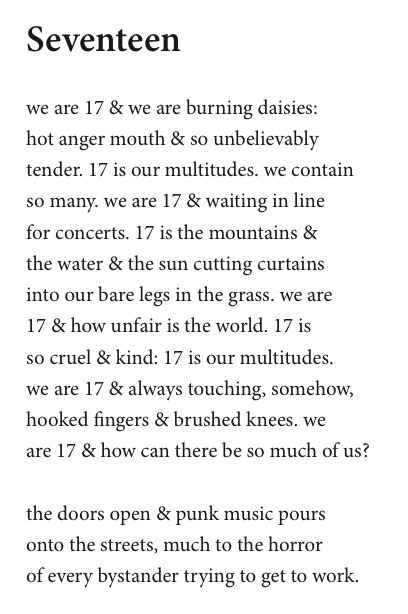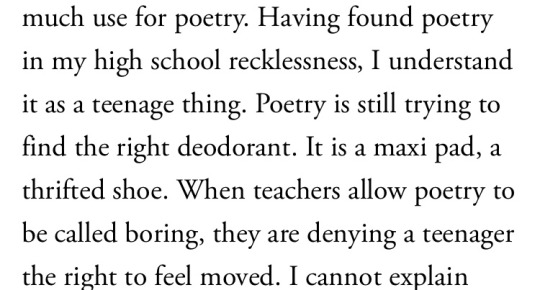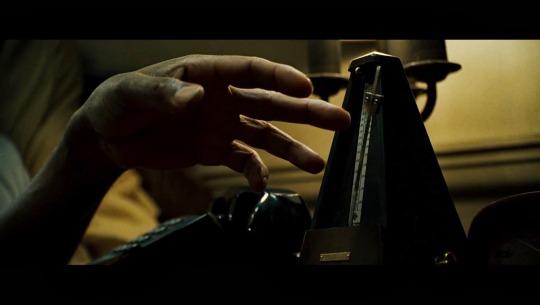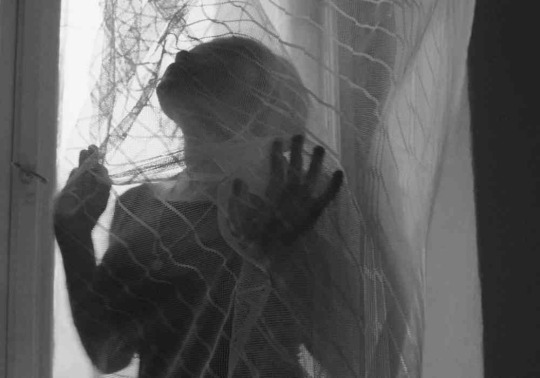#its frustrating to be on the brink between childhood and adulthood. try and remember that its liminal state and not your damnation <3< /div>
Explore tagged Tumblr posts
Note
Poems/books for being seventeen?

Silas Denver Melvin, from Grit
I saw an exquisite pink and blue shell on the sea-bottom. I dove for it, and held it, smooth and hollow in my hand all the morning. I decided it was a lucky charm, and that I would keep it. I am surprised that I have not lost it, for I lose everything. Today it is still pink and warm as it lies in my palm, and makes me feel like crying.

Françoise Sagan, from Bonjour Tristesse (1954) // movie still from Bonjour Tristesse (1958)


Kara Jackson, Teenagers Are Not Exempt From Poetry (read full prose piece here)
Some recommendations of books I’ve read that deal with girlhood or being a teenager (not my faves, but enjoyable. Probably wouldn’t read them again, but objectively literature that might be of interest to you):
Brutes — Dizz Tate
The Virgin Suicides — Jeffrey Eugenides
The Ice Palace — Tarjei Versaas
Teenage Wasteland — Anne Tyler
Normal People — Sally Rooney
My Dark Vanessa — Kate Elizabeth Russell
We Were Liars — E. Lockhart
my notes on each recommendation:
SEVENTEEN: Exactly what being seventeen felt like to me. He has absolutely beautiful poetry on age, Seventeen is the first of those in the collection. I’ve loved measuring my growth by how I relate to these poems. You can download the entire collection for free, just check out his account @sweatermuppet, I’m sure he has a link somewhere (or drop him an ask)! One of my favourite collections, it really embodies the feeling of being young, so the rest of the poems might also be of interest to you. I find myself rereading them all of the time. Love your work, Silas! Can’t wait for more poetry
BONJOUR TRISTESSE: I don’t remember the protagonist’s age exactly, but the author was seventeen when she wrote it. Very breezy, very summery, contains the whole spectrum of teenage emotions, from raging anger to audacious freedom. The protagonist is both astute and very childish. This book is so obviously written by a teenager, and I mean this as the highest compliment. You don’t get adults writing about being seventeen like that. She is seventeen. Seventeen is this story’s essence. I haven’t seen the movie, but it’s on my watchlist. Heard it’s good though!
TEENAGERS ARE NOT EXEMT FROM POETRY: I read this the other day and think it would have been very affirming for teenage me, who felt insecure about reading and writing poetry. Some lines really stuck with me and I think the writer’s youthful voice captures the solace teenagers might find in poetry very well. There is a freshness to that discovery. I remember reading Ginsberg for the first time and life feeling ten times wider even though my English was not broad enough for me to understand his work in its entirety. Discovering art at that age is a privilege, I believe most people will struggle to feel the same awe and wonder in later years. The author of this prose piece mentions many different poems that might interest you!
BRUTES: Read it last year and honestly found it kind of disappointing. Very interesting style, though, as most (all?) of it is written from the perspective of a group of teenage girls, using ‘we’ and ‘us’ instead of ‘I’ and ‘me’. I think I would have liked it a thousand times more, had I read it earlier in life. Fantastic book cover
THE VIRGIN SUICIDES: Very obviously written by a man, but nevertheless an interesting study of teenage love and obsession (there’s an excellent movie adaptation by Sophia Coppola!)
THE ICE PALACE: If I remember correctly, the protagonists are younger than seventeen, but it’s a very moving story about how young people grieve. Norwegian author, which I found very interesting, as I haven’t read a lot of Scandinavian literature
TEENAGE WASTELAND: Not for me, this one! But you might have different taste. After reading some reviews, it seems like people either hate or love this short story
NORMAL PEOPLE: I am not a huge Sally Rooney fan, but I do understand why people adore her so much. I thought Conversations With Friends was a better book, but that’s partly because I found it more relatable. Normal People is a very intelligent story on young love, class differences and the reality of many relationships. The opposite of a ‘happily ever after’ book, left me feeling unresolved and unsatisfied, as I believe it intended
MY DARK VANESSA: I’m not sure if recommending this too a teenager is wise, but it is certainly a very good book. Heavy stuff, though. Deals with emotional manipulation and violence directed at a teenaged girl in form of a predatory relationship. Rarely read something that made me feel so uneasy by manipulating me as the reader. I read it as a teen and it impressed me very much! Be safe, please. If you are easily disturbed, check any content warnings!
WE WERE LIARS: Something suspenseful that will suck you in, a summer-y and kind of light book. Definitely entertainment literature, but there’s nothing wrong with that. Probably won’t change your life, but also won’t bore you. Cool friendship dynamics between teenagers!
#I really took my time curating this list for you! I hope you’ll find something you’ll like :-)#I know being seventeen is difficult. for me it was the year I graduated Highschool and tasted the freedom of adult life for the first time#i was also the angriest I had ever been at 17 I think. it can be a frustrating and lonely age#all I can say is that it really does pass! the anger will eventually fade (for me it did at least)#its frustrating to be on the brink between childhood and adulthood. try and remember that its liminal state and not your damnation <3#a liminal state*#sorry if you didn’t want advice! hope this list makes you feel seen & provides you with some good hours of reading!#also if anyone else read this post I’d love to do more of these! specific recommendations are so much fun#book recommendations#literature recommendation#recommendations#girlhood#seventeen#on girlhood#on being seventeen#on childhood#on growing up#bonjour tristesse#french literature#literature#poetry#books#litblr#grit#webweaving#web weaving#intertextuality#mine#my recommendations#my reading
18 notes
·
View notes
Text
Subject of Sin - Part 1.
Incubus Shigaraki x Nun reader; NSFW
Warnings: noncon, dubcon, somnophilia, possessive behavior, desecration of religion, monsterfucking.
Word count: 2,520
A/N: A huge thank you to @shigamothki-vs-the-lamp for beta’ing and inspiring me to finish this fic!
Your innocent forays into temptation and sin catch the attention of a demon.
Part 1| Part 2
“He sleeps inside my soul And sometimes wakes up in the night And plays with my dreams.” — Fernando Pessoa
Demons lurk within our minds, not in the crevices of forgotten places. If the darkness ebbs and flows, it is merely a reflection of our innermost desires — a manifestation of sin that refuses to be held at bay any longer.
You kept Father’s teachings close to heart and steadfastly studied the scripture. It was the only hope you had to cling to, having been hidden away at a monastery since childhood. Life was kind and peaceful, and you spent your days deep in prayer and tending to the ill and destitute alongside your sisters.
And yet, one way or another, something began to stir within you. It crept up on you throughout the years in the form of innocent temptations — a yearning to explore the local village for just a while longer, exhilaration after allowing a baker to slip a sweet roll into your satchel as thanks for helping his daughter, despite knowing you were not allowed to accept gifts from others, unrecognizable melancholy as you stared out into the sea of rolling hills on a crisp autumn day and admired the endless blue sky — so many little temptations that doused the bright flames of your spirituality and allowed the darkness to spread.
It was difficult to notice the change. Even when you found yourself restless and cursing the pain shooting up your knees as you knelt before a pew, you quelled your inner conflict with prayer and fasting. But adulthood brought about new challenges. The cracks within your restless spirit had spread like ivy and primed you for your first mistake.
Your day started like any other. Winter ensnared the grounds of the monastery in blankets of glimmering snow and stinging winds that proved difficult to overcome. The villagers were kind enough to send provisions to the monastery, ferried up the winding hills of gnarled oaks by a gentleman who you had seen many times. He was handsome and friendly, his inky windswept hair plastered across his forehead and cheeks nearly as red as his eyes. Father had the pleasure of speaking to him more often than not, but you still attempted to catch a glimpse of the man under the pretense of unloading the cart. Your heart always stirred at the sight of his warm smile.
You should not have entertained your silly whimsies. You should not have gone to bed with impure thoughts after a hasty Hail Mary, staring into the flames of the hearth as you huddled beneath your blanket and slipped a hand between your quivering thighs, watching the glowing red and orange hues of burning cracks within the firewood and remembering those beautiful eyes. The experience was so humiliating that you hurried out of bed in the dead of night and ran straight to the church, letting the sharp pain of cold snow against your bare feet guide you ever further towards your only chance of salvation.
The imposing silence of the church did little to soothe your nerves. Towering walls of barren stone and creaking wooden pillars surrounded you, devoid of hospitality in the dead of night. You took a few meek steps towards the altar. Unable to meet the solemn gaze of your savior, you scurried off to find Father’s private quarters instead. Your loud knocking had clearly startled the man into wakefulness. The poor priest looked just as frazzled as you felt, and you made sure to apologize profusely for your rude behavior as you dragged him to the confessional with tears streaming down your face.
Father had been so deathly silent while you told him about your infatuation with the villager that you were certain he would scold you good and proper. But no, he had been as compassionate as he always was, offering words of comfort and forgiveness.
That should have been the end of it. You did not see the villager for days after your shameful act. The mundane tasks of everyday life kept you busy. So busy, in fact, that you managed to work yourself to the brink of exhaustion one day, and you fell asleep in the alcove of the library like some kind of child.
You did not remember dreaming. Consciousness trailed on the edge of a feeling that stirred you from slumber — a barely-there touch brushing along your bottom lip, followed by a short puff of cold air that fanned across your face and startled you awake. The candle beside you innocently flickered and waved in greeting, and the shadows around you mockingly mirrored its dance.
This game of ethereal cat and mouse continued for weeks. Every so often you would feel lingering sensations trailing along your face whenever you let your mind wander, growing only bolder once you removed your constricting habit within the sanctity of your bedroom. With your hair freed from its confines as you brushed through the soft strands, sometimes you imagined a hand trailing after the brush with each downstroke. It reminded you of how your Mother Superior combed her fingers through your hair to prevent tangled knots from hurting you.
All of this, you could attribute to your imagination … until the sharp divide between fiction and reality steadily grew muddled.
A particularly strange encounter occurred one evening. You opened your small window and pensively stared out into the snowy landscape, a singular thought daring to escape your wicked mouth, where none but God could listen to your act of rebellion.
“I want to be out there,” you had whispered solemnly.
A breeze rolled through in answer, and you marveled at how the air caressed your cheeks and smoothed unruly strands of hair away from your face.
It had felt so tender and comforting. You froze in shock for only a moment before something spurred you to hurriedly close the window and hide yourself in bed.
If only it had been that easy — the following night proved to be more tempting than the last. You were woken up by a tingling sensation on your lips, and a new feeling altogether.
Something firmly cupped your breast through your nightgown. Or could it simply be your blanket tightened around you from thrashing in your sleep?
Your nipple hardened into a stiff peak, begging to be played with. You kept your eyes firmly shut and blushed at your wanton display, modesty briefly overtaking your lustful urges. Yet try as you might, you could not resist bringing your fingers ever downward. Your nightgown had ridden up to your hips, and as the blanket caressed the sensitized skin of your inner thighs and tightened around your breast, you buried your face in your pillow and gently eased a finger through your slick folds.
Your efforts were clumsy and inexperienced. It was utterly frustrating, your hips canting upward to try to find the right angle and failing miserably at it. Your brows furrowed in anger and concentration, and in your delirious frenzy to reach your peak, you found yourself arching your back into that strange grasp on your breast. A gentle swipe along your hardened nipple elicited a breathy gasp, and the feeling of fingers carding through the hair at your temple made you whimper and tilt your head in search for more.
Something slid along the back of your hand and coaxed it into a new position. Your mouth opened in a wordless cry as you finally hit a perfect spot deep within you. The tingling sensation tickled your lips again, and for some odd reason, you felt compelled to stick your tongue out just a little bit, your breath hitching as something soft and warm glided along the wet muscle.
It should have knocked all sense back into you. It nearly did, if not for your cunt pulsing around your fingers as you moaned and chased the aftershocks of heady pleasure with each roll of your hips. Liquid exhaustion flooded your body, urging you to slump back in relaxation. You had just enough energy to carefully remove your sticky hand from beneath your sheet and lay it on the edge of the bed before sleep overtook you. In the morning, you would find your fingers mysteriously clean.
You kept that night a secret. Overcome with shame and disgust, you could not bring yourself to admit to Father that you had broken your vows once again and strayed from his guidance.
“None will know, and therefore it never happened,” you angrily muttered to yourself as you strutted through the snowy grounds of the garden and tightened your wool cloak around you for warmth. “My sanctity is worth more than my foolish pleasure.” A stray rock caused you to nearly trip, and you had to suck in a deep breath to keep yourself from losing your calm.
The more you distanced yourself from the truth, the more you were drawn into the darkness. You kept your secrets safely guarded, playing the part of a devout sister while your aching loneliness was soothed by the balm of an unseen force that played with your senses.
Sometimes you imagined a glimmer of shifting light at the edge of your periphery, but you dared not look. Not ever. The gentle caresses were more than enough to satiate your desires.
Or so you told yourself.
A winter storm was in full effect tonight. Not a soul dared to prance around the cold corridors, which meant you had no chance of being interrupted by a wayward young initiate or an unruly sister with a penchant for late-night gossiping. You were freshly washed and warmed by the fire, your unbound hair fanned out across your pillow and your nightgown scandalously discarded over the back of your chair.
For the first time in your life, you did not bend the knee to pray before rest. Your heart thudded loudly in your chest as you stared at the golden cross hammered above your doorway, its edges aglow from the light of the fireplace.
“God forgive me,” you quietly uttered, and closed your eyes to banish the cross from your sight.
For a while, all you could hear was the sound of howling wind and crackling fire. You were half-tempted to begin all by yourself, but you had learned to be patient. Your visitor always made itself known when you were tethering on the precipice of sleep. Perhaps the delirium that followed exhaustion played tricks on you. Perhaps that had been the culprit all along.
Either way, you wanted it.
And so you let yourself slip free from anticipation and restlessness, the tension in your muscles dissipating as your breathing gradually slowed and you could no longer hear the wind or fire. All you knew was peace. All you perceived was stillness.
It was quiet. Far too quiet. Something felt different tonight.
You were overcome by the sensation of falling, and your body jerked lightly in response. It roused you from the precipice of slumber, and in your hazy confusion, you had enough common sense to keep your eyes closed. Ever so patient, you waited for what would come next, despite the goosebumps forming on your skin that had nothing to do with the cold and everything to do with the feeling of being watched.
A light weight pressed down onto your chest, as though a kitten had curled up there. You focused on your breathing and parted your lips, allowing your soft sighs to slip through. It always liked when you did that. Your mouth tingled a bit. You slowly licked along your bottom lip, and the weight on your chest became incrementally heavier.
A pulse of wetness gushed out of your cunt in anticipation. You rubbed your thighs together for friction and accidentally bunched your bedsheet at your feet, making it slither down your body to expose your breasts. The cold air caused your nipples to harden, and an even colder puff tickled one nipple before an altogether unique sensation followed — soft and textured, like a velvet ribbon, gliding around the stiff bud and ending its journey with a teasing flick.
You moaned quietly as you gripped the sheets beneath you. This time, something sighed against your mouth, trailing along your tongue and all the way to the back of your throat. Before you could make sense of the new experience, a firmer pressure settled over your lips, far more solid and real than any tantalizing tingle had ever felt.
You were delirious with need. Completely and utterly lost to your impulses, and you hadn’t even touched yourself yet.
Something was kissing you, and you were too far gone to consider the implications. Nevermind that you were in a compromising situation and forsaking your vows to the Lord.
Right now, all that mattered was how rough that touch felt against your lips, how slowly it guided your mouth into a deep kiss that smothered your whimpers and gently sucked at your lips with a lewd wet sound. Velvet glided along your tongue, twining like a serpent and licking every crevice of your mouth. It was overpowering, toe-curling, intoxicating. You were swept away by the myriad of sensations, moaning as your nipple was twisted and pinched, and the hair at your temple was lovingly, tenderly brushed through.
Familiar. You knew that touch. You craved it, and you wanted more. No one had ever made you feel like this before. No one ever would, not within these sacred halls.
What if —
What if you dared to look? Just this once, what if you stepped out from the protective embrace of your religion and just …
As though reading your mind, the firm pressure on your mouth disappeared. You opened your eyes, and forgot to breathe.
God help you.
Scarlet eyes. Redder than blood, oh so familiar in their beauty, yet entirely devoid of life. They burned like hellfire, slashed through by slitted pupils that honed in on you with an unyielding stare.
And the skin. You had never seen anything like it on a living creature, this sickly gray shade among numerous cracks and scars that marred the entity’s torso and face. Your gaze trailed over the strange markings around those serpentine eyes, your stomach churning uneasily as your worst suspicions were confirmed — the striated grooves winded and merged into the graceful arch of a pair of horns that curled back into sharp tapered ends.
You were consorting with a demon.
He looked corrupted, as though his very essence carved its demonic aura into his flesh. In a moment of bewildered hysteria, you honed in on the scars etched into his face, briefly noting that he had a mole just below the corner of his mouth, of all things —
The demon readjusted his position, comfortably resting his weight on top of you as his arms caged your head and his hands cradled your face. His fingers carded through your hair in a mockery of affection, and he smiled at you, all sharp teeth and cracked lips.
You wanted to throw him off of you. You wanted to kick and scream and beg the Lord for forgiveness and protection.
You were frozen in place instead.
#shigaraki tomura#shigaraki x reader#shigaraki/reader#shigaraki tomura/reader#shigaraki tomura x reader#tw: noncon#tw: dubcon#tw: somnophilia
1K notes
·
View notes
Text
5 Directors and The Way They Ace Pace

Published on the Raindance blog 05/09/2018
Someone once compared watching a film to listening to a piece of music. Thinking about the whole process, it makes sense. Music notes on sheet paper guide musicians to play a piece of music in harmony led by a conductor. And yet music is not just about fitting all those components together like a puzzle. Instead they meld and cohere so invisibly to create a mood and flow of that piece. This is like film. Cinematography, sound design, editing, writing and actors all lift a story onto the big screen but don’t work in and of themselves. Their roles sync to create the right atmospheres for engaging narratives.
Understanding film like music cannot be a better comparison to situate pace in film: because pace is all about establishing mood and flow. Watching a film is about experiencing its patterns, the symmetry of its parts and, very importantly, timing. Pace relates to the progress of the narrative arc; how we are guided through the story. We engage with the scenes in terms of the flow of dialogue and action, in other words, its rhythm.
But understanding what we mean by pace can be very difficult because it is subtle. Let’s just say that bad pacing is when something happens too long on screen or contrarily too short: we’re either twiddling our thumbs, waiting for the next piece of information to reveal itself or are confused because we haven’t had enough time to process what we see. Good pacing constantly mediates that middle ground, adjusting between fast and slow to keep us emotionally engaged through one and a half hours of storytelling.
I’ve chosen to examine how 5 contemporary directors use pace in order to understand how films can be read this way. Although it’s not often explicit, the way these directors have paced their films have been influential in defining their specific directorial style.
1. David Fincher

David Fincher is perhaps most known for his hard-boiled, fast-thinking and emotionally twisted protagonists. Think the insomniac narrator in Fight Club, whiz brain Zuckerberg in The Social Network and the frantic but driven cartoonist Graysmith trying to find a killer in Zodiac. By following the journey of these characters, the pace of Fincher’s films are mostly fast, sharp and succinct. His punchy dialogue is definitely key to this, but also his slick editing and camerawork. Fincher for instance has this camera technique of following the movement of characters, tracking alongside them as they walk; lingering as they pause. It’s as if we’re experiencing the events alongside them, searching for truths the same time they are. Fincher always provides us with a lot of information to grasp in a short space of time, often jumping between different points in time, yet his films’ steady pace helps us process all of that whilst focusing on a clear plotline. As a result, you can pick up new details in his films with every viewing. However, Fincher’s best achievement lies in the way he brings his viewers to the level of his protagonists’ pace of thinking. When we watch the Social Network we can’t help but start think fast like Zuckerberg. This is the crux to the way Fincher builds suspenseful plotlines.
2. Quentin Tarantino

People usually associate violence with fast-paced thrillers. Violence in Tarantino’s films however occurs at a purposefully measured pace, usually at the end of a very long piece of dialogue, to make it all the more unexpected and ruthless. If you think of the opening scene of Inglorious Bastards, SS colonel Hans Landa has a pretty banal conversation with the dairy farmer, but psychologically transforms him into such a nervous wreck that he is led to reveal the Jewish family hiding under his floorboards. This scene draws out the characters’ conversations line by line, dragging out the tension without changing pace for as long as possible to the point of becoming unbearable: then he brings out the guns. Pensive but suspenseful pacing is particular to Tarantino in making viewers wait to jolt at newly erupted action. Additionally, Tarantino often utilizes confining claustrophobic spaces to establish power dynamics between characters. The intrusion of a Nazi officer in the basement bar of Inglorious Bastards for instance is a visual disruption because he walks in from a different camera angle within that space. This change in framing is disarming and considerably changes the flow of the scene, showing how instrumental shot composition is to pace.
3. Damien Chazelle

Music has been the main subject of Oscar-winning Damien Chazelle first two features, Whiplash and La La Land. As a musical, La La Land is obviously filmed and edited according to the film’s soundtrack but I found Chazelle’s other film Whiplash equally fascinating in a rhythmic sense. Chazelle’s debut feature centers on an ambitious student drummer challenged physically and psychologically by a renowned but abusive conservatory teacher, Terrence Fletcher. Whiplash opens on the protagonist, Andrew Neiman, playing on his kit, his drum roll in gradual crescendo as the camera pushes forward to a close up. This audio-visually establishes the increasing emotional frustration Andrew experiences throughout the film on the pulse of a drumbeat, pushed further to the brink of sanity. Sound architects Andrew’s state of anxiety and the film’s spiraling tension. In a finale jazz performance, when Andrew realizes he has been cheated by Fletcher he takes the orchestra into his own hands with an electrifying drum solo. Conductor and drummer lock heads in battle on the basis of whether Andrew will lose his furious beat, at times matching viewers’ racing heartbeat. Chazelle’s method of pacing posits Whiplash’s key point of contention: is Fletcher trying to screw Andrew over, or by challenging him does he help him become famous?
4. Terrence Malick

Whilst for Fincher pace is key to locking viewers into characters’ minds, the films of Terrence Malick remove them from the main narrative focus altogether. Malick’s films have often (controversially) been described as poetic essays, extended philosophical enquiries on the meaning of life. This is because he has a specific form of cinematic storytelling that is based on loosely associated images, using a drifting camera wafting in and out of a scene, placing characters in an out of focus. This is particularly distinctive to the flow of Malick’s work that doesn’t impose a particular way of viewing action according to characters’ perspectives. Malick builds his filmic narratives around moments and gestures, as if we’re guided by characters’ stream of consciousness. In Tree of Life for instance, Malick tries to express how protagonist Jack searches the farthest recesses of his mind to bring back his earliest childhood memories. The dislocated images and snippets of voices embody that indeterminacy of remembering. It’s Jack’s sensorial rather coherent experience that Malick tries to convey in his particular cinematic language. His sense of pace establish that illusion of what is floating, lilting and lyrical; to show how action doesn’t have a purpose or ending but just wafts in front of the camera.
5. Lynne Ramsay

Studying the pace of Lynne Ramsay’s work is intriguing on the basis of her formal background as a photographer. Her aesthetic practice weaves into her cinematographic work because they are as detailed as photography itself. What we see in her films are studies of characters, focusing on details that break free from the confines of the plot and set up a pace to her films both tender and meditative. Ramsay tells stories of ordinary people’s lives, oftentimes harrowing or burdened by grief or pain, and within the worlds they inhabit she unfolds images and sounds that make us immerse in its folds and textures. As opposed to Whiplash’s plot-driven sound and image, to Ramsay they are part of her attention to detail. This is to show the way James in Ratcatcher wraps himself in a curtain, as if shrouded by his friend’s death who drowned in a bog. There’s this memorable close-up shot of ants crawling on a jam sandwich in We Need To Talk About Kevin. This not only reveals the mess left by an ill-mannered boy, but also how his parents, by post-poning the problem, let it grow into a bigger one. Through careful framing and shot choices, both films portray different portraits of childhood and adulthood, revealed in the visual pacing of their day-to-day lives.
0 notes